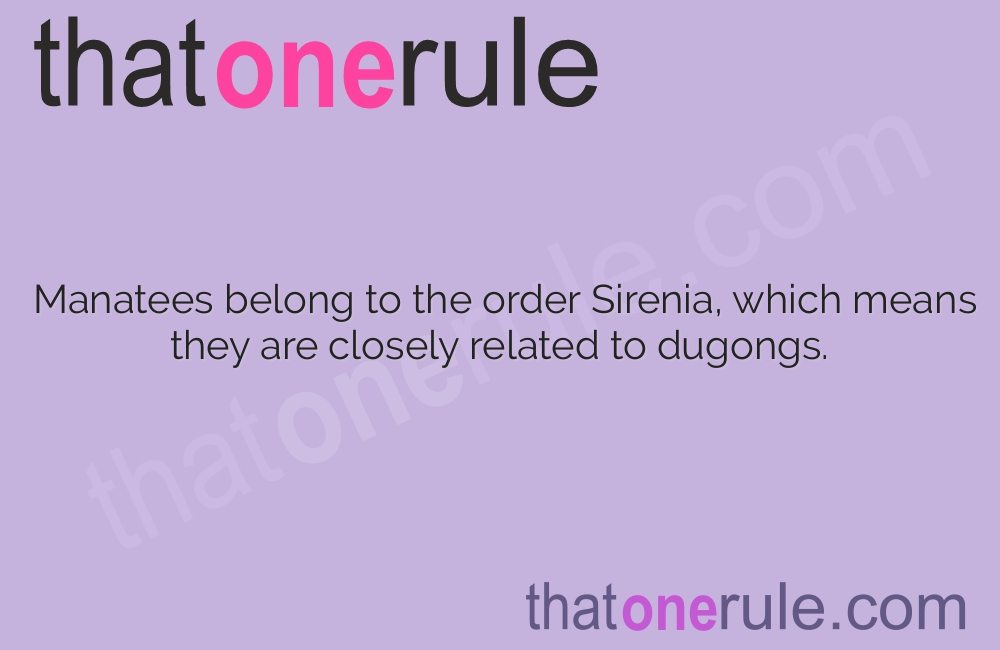Discover Fascinating Facts about Manatees

Manatees belong to the order Sirenia, which means they are closely related to dugongs.
Manatees are often referred to as sea cows due to their slow, herbivorous nature.
Although they are mammalian, manatees can hold their breath for up to 20 minutes.
Manatees have no natural predators, but human activities pose significant threats to their survival.
The average weight of an adult manatee is around 1,500 pounds.
Manatees spend most of their time grazing on sea grasses and other aquatic plants.
Unlike most mammals, manatees have a continuously growing set of teeth that are replaced throughout their lives.
Manatees are very gentle creatures and are known to interact with humans in a friendly manner.
The closest living relatives to manatees are elephants.
Manatees can eat up to 10% of their body weight in vegetation each day.
Manatees are excellent swimmers and can reach speeds of up to 15 miles per hour in short bursts.
The closest living relatives to manatees that are extinct are the Steller’s sea cow and the Caribbean monk seal.
Manatees have the ability to close their nostrils to prevent water from entering while they are underwater.
Manatees communicate with each other using a variety of vocalizations, including chirps, squeaks, and whistles.
Manatees have a very slow metabolic rate, which is why they can survive on a diet of low-nutrient sea grasses.
Manatees have poor eyesight but make up for it with an excellent sense of hearing and touch.
Discover Fascinating Facts about Manatees part 2
Manatees have been known to travel long distances, with some individuals swimming over 1,000 miles.
Manatees are native to the warm coastal waters of the Atlantic Ocean and the Gulf of Mexico.
Manatees have a unique sense of direction and can navigate accurately using internal compasses.
Manatees are social animals and can often be found in groups called aggregations.
Manatees have been spotted in freshwater rivers, estuaries, and even man-made canals.
Manatees have a lifespan of around 60 years in the wild.
Manatees are considered a keystone species, as their grazing helps shape and maintain healthy aquatic ecosystems.
Manatees have been the subject of various conservation efforts to protect them from threats such as boat collisions and habitat loss.
In some cultures, manatees are considered symbols of good luck and protection.
Manatees have a thick layer of blubber that helps to insulate them in cold water.
Manatees are protected by law in many countries, including the United States.
Manatees have a prehensile upper lip that they use to grab and manipulate food.
Manatees are solitary animals for most of the year, but they come together during mating season.
Manatees have a low reproductive rate, with females giving birth to a single calf once every two to five years.
Manatee calves stay with their mothers for up to two years before becoming independent.
Manatees can withstand changes in water salinity, allowing them to move between freshwater and saltwater habitats.
Manatees have few natural predators, but sharks and alligators have been known to attack them on occasion.
Manatees have a vulnerable spot just above their tails called a paddle spot, which is used for identification purposes.
Manatees can close their ears to prevent water from entering while underwater.
Manatees are curious animals and have been observed playing with objects such as floating buoys and boats.
Manatees have a slow metabolic rate, meaning they have a low energy requirement and can eat large amounts of food in a short time.
Manatees are excellent divers and are capable of reaching depths of up to 20 feet.
Manatees have a unique skeletal structure, including dense bones that help them regulate buoyancy.
Manatees have been known to migrate in response to changes in water temperature.
Manatees have a thick, leathery skin that helps protect them from rough surfaces and predators.
Manatees are herbivorous and have a specialized digestive system that allows them to process tough plant material.
Manatees’ lungs are positioned further back in their bodies compared to other mammals, allowing them to breathe while partially submerged.
Manatees have few natural enemies, but they do face threats from pollution, boat strikes, and habitat destruction.
Manatees are gentle giants that play a vital role in maintaining the health of our ocean ecosystems.